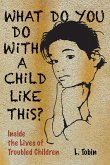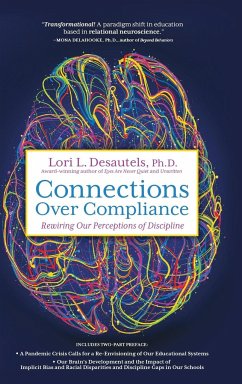Kottler, Jeffrey A., Ph.D., Ellen Kottler
Students Who Drive You Crazy
Succeeding with Resistant, Unmotivated, and Otherwise Difficult Young People
Kottler, Jeffrey A., Ph.D., Ellen Kottler
Students Who Drive You Crazy
Succeeding with Resistant, Unmotivated, and Otherwise Difficult Young People
- Broschiertes Buch
- Merkliste
- Auf die Merkliste
- Bewerten Bewerten
- Teilen
- Produkt teilen
- Produkterinnerung
- Produkterinnerung
Discover more strategies for managing difficult students, with new information on aggressive/violent behavior, tips for establishing positive relationships with parents, and more.
Andere Kunden interessierten sich auch für
![What Do You Do with a Child Like This? What Do You Do with a Child Like This?]() L. TobinWhat Do You Do with a Child Like This?22,99 €
L. TobinWhat Do You Do with a Child Like This?22,99 €![Connections Over Compliance Connections Over Compliance]() Lori L DesautelsConnections Over Compliance40,99 €
Lori L DesautelsConnections Over Compliance40,99 €![Learning the Hidden Curriculum: The Odyssey of One Autistic Adult Learning the Hidden Curriculum: The Odyssey of One Autistic Adult]() Judy EndowLearning the Hidden Curriculum: The Odyssey of One Autistic Adult18,99 €
Judy EndowLearning the Hidden Curriculum: The Odyssey of One Autistic Adult18,99 €![Transforming Troubled Lives Transforming Troubled Lives]() Transforming Troubled Lives185,99 €
Transforming Troubled Lives185,99 €![Connections Over Compliance Connections Over Compliance]() Lori L DesautelsConnections Over Compliance26,99 €
Lori L DesautelsConnections Over Compliance26,99 €![Behavioral Disorders Behavioral Disorders]() Behavioral Disorders200,99 €
Behavioral Disorders200,99 €![Introducing Autism Introducing Autism]() Ruth ErenIntroducing Autism56,99 €
Ruth ErenIntroducing Autism56,99 €-
-
-
Discover more strategies for managing difficult students, with new information on aggressive/violent behavior, tips for establishing positive relationships with parents, and more.
Hinweis: Dieser Artikel kann nur an eine deutsche Lieferadresse ausgeliefert werden.
Hinweis: Dieser Artikel kann nur an eine deutsche Lieferadresse ausgeliefert werden.
Produktdetails
- Produktdetails
- Verlag: SAGE Publications Inc
- 2 Revised edition
- Seitenzahl: 170
- Erscheinungstermin: 22. August 2008
- Englisch
- Abmessung: 229mm x 152mm x 9mm
- Gewicht: 262g
- ISBN-13: 9781412965293
- ISBN-10: 1412965292
- Artikelnr.: 24954492
- Herstellerkennzeichnung
- Libri GmbH
- Europaallee 1
- 36244 Bad Hersfeld
- gpsr@libri.de
- Verlag: SAGE Publications Inc
- 2 Revised edition
- Seitenzahl: 170
- Erscheinungstermin: 22. August 2008
- Englisch
- Abmessung: 229mm x 152mm x 9mm
- Gewicht: 262g
- ISBN-13: 9781412965293
- ISBN-10: 1412965292
- Artikelnr.: 24954492
- Herstellerkennzeichnung
- Libri GmbH
- Europaallee 1
- 36244 Bad Hersfeld
- gpsr@libri.de
Jeffrey A. Kottler is one of the most prolific authors in the fields of counseling, psychotherapy, and education, having written more than 90 books about a wide range of subjects. He has authored a dozen texts for counselors and therapists that are used in universities around the world and a dozen books each for practicing therapists and educators. Some of his most highly regarded works include Creative Breakthroughs in Therapy, The Mummy at the Dining Room Table: Eminent Therapists Reveal Their Most Unusual Cases and What They Teach Us About Human Behavior, Bad Therapy, The Client Who Changed Me, Divine Madness, Change: What Leads to Personal Transformation, Stories We've Heard, Stories We've Told: Life-Changing Narratives in Therapy and Everyday Life, and Therapy Over 50. He has been an educator for 40 years, having worked as a teacher, counselor, and therapist in preschool, middle school, mental health center, crisis center, nongovernmental organization, university, community college, private practice, and disaster relief settings. He has served as a Fulbright scholar and senior lecturer in Peru and Iceland, as well as worked as a visiting professor in New Zealand, Australia, Hong Kong, Singapore, and Nepal. He is professor of counseling at California State University, Fullerton.
Preface Acknowledgments About the Authors 1. Why Do Some Students Drive You Crazy? At a Loss About What to Do Eye of the Beholder So, Who Gets to You? 2. Which Students Challenge You Most? Students From Hell Profiles of Students Who Are Difficult Placing Actions in Context 3. Understanding Students
Challenging Behavior They Are Doing the Best They Can Additional Functions of Conflict When Biology Has Its Say Creating Difficult Students Multiple Viewpoints 4. What Students Do to Make You Crazy Separating Students and Behavior Protecting Yourself Pushing Our Buttons How Failure Helps Engaging the Challenging Student Recognizing Your Limitations Don
t Take the Conflict Personally It Comes With the Territory 5. Changing Your Own Behavior Detachment Without Withdrawal Talking to Yourself Processing Disappointments Internally Stop Complaining Keeping Your Sense of Humor Recognizing Accomplishments and Strengths Reframing Problems Being Flexible Seeking Support Help Yourself First 6. Strategies for Changing Students
Behavior Some Rules of Engagement Develop a Sense of Community Use Counseling Skills Collaborate With Others Brief Interventions Develop Alternate Perspectives 7. Parents and Colleagues Who Drive You Crazy The Least of Our Problems Teachers Who Don
t Understand Administrators Who Handcuff Us Parents Who Fight Us What About You? Those Who Abuse You 8. Preventing Future Problems Proactive Versus Reactive Strategies Paying Attention to Feedback Teacher Strategies That Maintain Momentum Conflict Resolution In Summary References and Suggested Readings Index
Challenging Behavior They Are Doing the Best They Can Additional Functions of Conflict When Biology Has Its Say Creating Difficult Students Multiple Viewpoints 4. What Students Do to Make You Crazy Separating Students and Behavior Protecting Yourself Pushing Our Buttons How Failure Helps Engaging the Challenging Student Recognizing Your Limitations Don
t Take the Conflict Personally It Comes With the Territory 5. Changing Your Own Behavior Detachment Without Withdrawal Talking to Yourself Processing Disappointments Internally Stop Complaining Keeping Your Sense of Humor Recognizing Accomplishments and Strengths Reframing Problems Being Flexible Seeking Support Help Yourself First 6. Strategies for Changing Students
Behavior Some Rules of Engagement Develop a Sense of Community Use Counseling Skills Collaborate With Others Brief Interventions Develop Alternate Perspectives 7. Parents and Colleagues Who Drive You Crazy The Least of Our Problems Teachers Who Don
t Understand Administrators Who Handcuff Us Parents Who Fight Us What About You? Those Who Abuse You 8. Preventing Future Problems Proactive Versus Reactive Strategies Paying Attention to Feedback Teacher Strategies That Maintain Momentum Conflict Resolution In Summary References and Suggested Readings Index
Preface Acknowledgments About the Authors 1. Why Do Some Students Drive You Crazy? At a Loss About What to Do Eye of the Beholder So, Who Gets to You? 2. Which Students Challenge You Most? Students From Hell Profiles of Students Who Are Difficult Placing Actions in Context 3. Understanding Students
Challenging Behavior They Are Doing the Best They Can Additional Functions of Conflict When Biology Has Its Say Creating Difficult Students Multiple Viewpoints 4. What Students Do to Make You Crazy Separating Students and Behavior Protecting Yourself Pushing Our Buttons How Failure Helps Engaging the Challenging Student Recognizing Your Limitations Don
t Take the Conflict Personally It Comes With the Territory 5. Changing Your Own Behavior Detachment Without Withdrawal Talking to Yourself Processing Disappointments Internally Stop Complaining Keeping Your Sense of Humor Recognizing Accomplishments and Strengths Reframing Problems Being Flexible Seeking Support Help Yourself First 6. Strategies for Changing Students
Behavior Some Rules of Engagement Develop a Sense of Community Use Counseling Skills Collaborate With Others Brief Interventions Develop Alternate Perspectives 7. Parents and Colleagues Who Drive You Crazy The Least of Our Problems Teachers Who Don
t Understand Administrators Who Handcuff Us Parents Who Fight Us What About You? Those Who Abuse You 8. Preventing Future Problems Proactive Versus Reactive Strategies Paying Attention to Feedback Teacher Strategies That Maintain Momentum Conflict Resolution In Summary References and Suggested Readings Index
Challenging Behavior They Are Doing the Best They Can Additional Functions of Conflict When Biology Has Its Say Creating Difficult Students Multiple Viewpoints 4. What Students Do to Make You Crazy Separating Students and Behavior Protecting Yourself Pushing Our Buttons How Failure Helps Engaging the Challenging Student Recognizing Your Limitations Don
t Take the Conflict Personally It Comes With the Territory 5. Changing Your Own Behavior Detachment Without Withdrawal Talking to Yourself Processing Disappointments Internally Stop Complaining Keeping Your Sense of Humor Recognizing Accomplishments and Strengths Reframing Problems Being Flexible Seeking Support Help Yourself First 6. Strategies for Changing Students
Behavior Some Rules of Engagement Develop a Sense of Community Use Counseling Skills Collaborate With Others Brief Interventions Develop Alternate Perspectives 7. Parents and Colleagues Who Drive You Crazy The Least of Our Problems Teachers Who Don
t Understand Administrators Who Handcuff Us Parents Who Fight Us What About You? Those Who Abuse You 8. Preventing Future Problems Proactive Versus Reactive Strategies Paying Attention to Feedback Teacher Strategies That Maintain Momentum Conflict Resolution In Summary References and Suggested Readings Index








